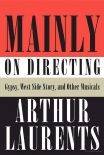Mainly on Directing Arthur Laurents (best ereader for epub .TXT) 📖

- Author: Arthur Laurents
Book online «Mainly on Directing Arthur Laurents (best ereader for epub .TXT) 📖». Author Arthur Laurents
This was the musical-theatre version of Bill Clinton's first run for president: with Hillary, her husband said, we the people were getting two for one. With Michael, Avian said, we the Cage people were getting two for one. I didn't want another director; neither did Jerry. We wanted Avian solo, and I said so, but that didn't end the game. Michael phoned: charming, admiring, another fan of Gypsy. Nevertheless, it was clearly Allan Carr who would be getting two for one and not I. Michael was offering to make Cage his next musical, and where Michael Bennett was ranked in the Broadway hierarchy, that was an offer that was not to be refused. But Jerry Herman and I had chutzpah: we refused.
I thought it would end there, but it didn't. Allan Carr, like every producer of a musical, went looking for a Broadway theatre for the show with the theatre owner ponying up a sizeable investment. Like every musical producer, he went to the Shuberts: they have most of the best musical houses. The Shuberts were Gerald Schoenfeld and Bernard Jacobs. Today only Gerry is left; Bernie is only a theatre. (Gerry is also a theatre; the Shuberts own them both.) Gerry was more than willing to give Allan a major Shubert house plus an investment of $500,000. He had only one requirement: replace Arthur Laurents with Michael Bennett.
Gerry and Bernie were as intense as lovers in their rivalry for the affection of Michael, but Michael Bennett would have been chosen by anyone on Broadway. Not by Allan Carr, though. Allan chose me. Imagine! Maybe to give the (manicured) finger to a Broadway that regarded him as a silly Hollywood queen; maybe because he sat through all those backer auditions and was impressed; maybe it simply was ego, insisting on backing the horse he entered the Broadway derby with. Whatever the reason, not another producer on Broadway would have done what he did. The God that loves loyalty among gays was pleased: Allan's loyalty paid off bigger than his dreams—and his dreams were enhanced by coke. La Cage aux Folles ran for four years, had several national companies, played London and Sydney, and made a fortune— more for Allan and his cronies than for his investors. He didn't come from Broadway and he never planned to stay on Broadway; maybe that's why he conquered Broadway.
Now to answer the unanswered questions above: who is responsible for what musical staging, etc. I didn't digress as an attempt to duck answering; the questions are too important. The basic underlying issue is director versus choreographer for control of the performance.
To risk an umbrella generalization, as a breed, choreographers are not too good with actors; consequently, they're not good at getting the performances that make musicals musical theatre rather than musical comedy. They're good with dancers, whom they understandably treat as bodies because they use them to create in the way authors use words and composers use notes. Actors have their own particular kind of creativity. They don't respond well to being used as putty. Even though in the end they may want to be told which way to go, they need to arrive at that point; they need to be treated as people. Even choreographers aware of that need have trouble getting an acting performance, because while they're fluent in the language of dancers, the language of acting is foreign to them. Their poetic metaphors are comprehensible (and flattering) to dancers; actors need less artistic and more specific speech to deal with subtext and unconscious emotions. The acting in the shining days of the choreographer/director shows was never quite as good as it could have been—not even in Fosse shows, which is odd, because the acting in his movies is very good. On the other hand, the acting in the movie of West Side Story is embarrassing (don't rely on memory, view it again, just the first ten minutes; you will be aghast at your younger judgment). The inept performances could be attributed to Hollywood's Robert Wise, who is screencredited with co-directing the movie with Broadway's Jerome Rob-bins. Wise, a former film editor, was the lauded director of several woodenly acted films—the movie version of The Sound of Music, for example, was his. Jerry, who at least asked for assistance in directing the acting of the original stage West Side, shared the Oscar for it with Wise





Comments (0)